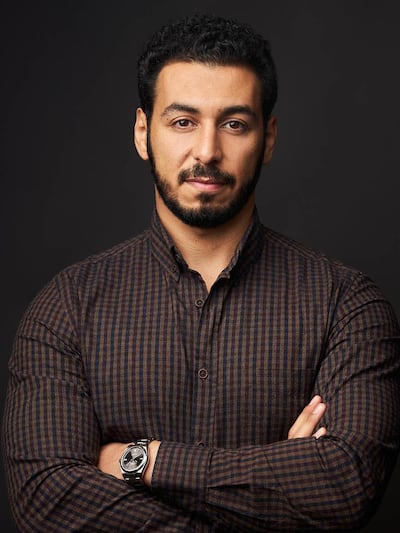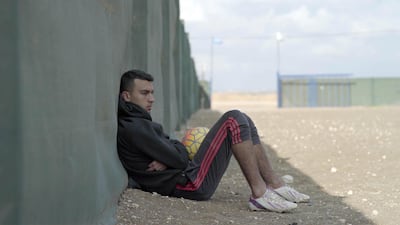Egyptian director Ali El Arabi says it's "a big burden" to helm the only Arab film at the Sundance Film Festival this year.
His documentary, Captains of Za'atari, about two teenage Syrian refugees trying to fulfil their dreams of becoming professional footballers, will play in the World Cinema Documentary Competition at the festival on Sunday, January 31.
As a consequence of the global pandemic, the event has reduced the number of films taking part, and will screen them online while also partnering with independent cinema communities across the US and beyond to host in-person events safely.
“I fluctuate between enthusiasm and fear,” the first-time director says, when asked what it feels like to represent the region at one of America’s most prestigious film festivals. “It’s a nice burden. I hope that the public likes the movie.”

El Arabi, 32, was stepping off a plane in Washington to research his next film when he received news about Sundance. "I had an email from my producers saying we need to talk to you now," he says.
The announcement took some time to sink in, and the gravity of it has been profound. "Being at Sundance will offer a lot of opportunities for my career, for my film, and most importantly, for the characters in the film."
The protagonists of Captains of Za'atari, teenagers Mahmoud and Fawzi, live in Zaatari refugee camp in northern Jordan. The camp opened in 2012 and at its peak hosted 150,000 Syrian refugees. It's a dire situation, but the boys do not wallow. They harbour dreams of becoming professional footballers, practising day in and day out. Fawzi, the older of the two by a year, is the captain of the Zaatari football team.

El Arabi first met Mahmoud and Fawzi in 2013. At the time, he was working as a war correspondent reporting on refugee camps in the Arab world for news channels. He found it dispiriting, not because of what he saw in the 19 refugee camps he estimates he visited, but because, as he says: "I didn't like the way the TV stations handled the material. They didn't look at these refugees as human beings with needs and ambitions; they looked at them as numbers and figures."
The director says he became a war reporter for altruistic reasons: "Making reportage and now making documentaries gives me a vantage point to tell stories because, deep down, I want to change the world for the better."
There were many reasons El Arabi wanted to follow the efforts of Mahmoud and Fawzi. "I was interested in what the human needs of the refugees are," he says.
“I was trying to trace what their lives looked like compared to how they wanted their lives to be. I found these two boys roaming around asking questions about how the world looked beyond the camp, and how they could escape the camp, and I thought such inquisitive youngsters could be inspiring for others.”
He believes their story will resonate with people because he saw himself in these ambitious children who want to improve their lives through sport. El Arabi grew up in a village in the Nile Delta, a rural area in northern Egypt, where he dreamt of practising martial arts. He trained with his friends who reached a level not too far from the professionals they admired. So, he was curious to see if these boys would fulfil their dreams.
"I lived with the boys inside the camp following them for five to seven months a year," he says. He decided to track what happened to them for the next few years, documenting their story as they developed as footballers, but more importantly as men.
The first year inside the camp was challenging as the residents treated the filmmaker with scepticism. The team needed to build trust by not changing the crew and having women on the production team who could talk to the women in the camp. At the start, they would also give their cameras to Mahmoud and Fawzi to build trust.
Mahmoud lives with his parents, two sisters and brother. It's a close-knit family and he takes his education seriously and has a sunny, romantic outlook on life. The more tempestuous Fawzi lives with his brother, younger sister and mother, and has dropped out of school to pin all his dreams on a sporting career. Their father tried to find work illegally and was arrested and banned from returning to the camp.
When El Arabi had been filming for three years, Aspire Academy, one of the world's leading sports academies, arrived to pick players for The Syrian Dream Team, for a tournament in Qatar.
It was the opportunity of a lifetime and has been portrayed as such in the film; there is an element of Steve James's seminal documentary Hoop Dreams, as El Arabi balances the human aspect with sporting dreams. As happens so often in sport, joy and heartbreak arrived at the same time. "The movie depicts two contradicting worlds," says El Arabi. "One is very poor, while the world of football is very powerful and rich."
The contrast between the two is apparent when the 19 Syrians chosen to play in the squad are put up in a fancy hotel, train on perfect pitches and get to see Bayern Munich's squad training. These moments are shot in a more glossy style. "I tried to show reality through the boy's eyes, seeing all that luxury compared to the camp" says El Arabi. "I needed to project this contradiction to the viewers to highlight that we live in two different worlds."
The arrival of the football academy feels like the stroke of fortune that all documentarians need. But El Arabi says what was important to him was not whether the boys made it or not. "Even if we do not achieve the dream, it's the desire and enthusiasm of seeking the opportunity for fulfilling the dream that is important."
El Arabi, who is yet to show the final film to his protagonists, says: "I'm super-scared, specifically for Fawzi because of the bits about his father. It might make him feel that loss again."
However, the director hopes screening the film will help the boys escape the camp. He has sent the movie to footballers including David Beckham, hoping to receive their support for the project. El Arabi says he wants everyone to reach their goals and live their dreams, just as the director will when Captains of Za'atari plays at Sundance.
Sundance Film Festival runs until Wednesday, February 3; sundance.org



